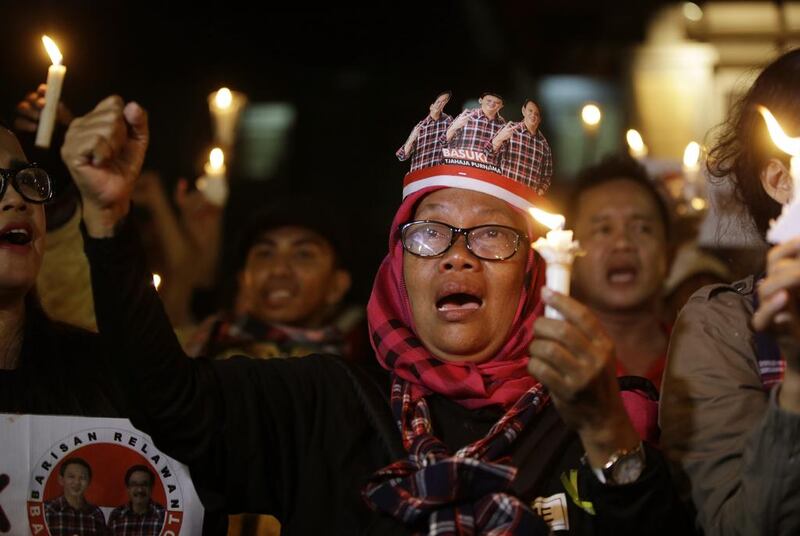JAKARTA // Moderate Muslim leaders and human rights activists have renewed calls for the repealing of Indonesia’s 1965 blasphemy law after the ethnic-Chinese Jakarta governor Basuki “Ahok” Purnama was convicted and jailed for misusing a verse in the Quran.
They say the growing use of the law, enshrined in Indonesia’s criminal code, inhibits free speech and has left Christians and other minorities feeling marginalised in a Muslim-majority nation whose secular constitution is meant to protect religious freedom.
There were only eight cases of blasphemy during authoritarian leader Suharto’s 32-year rule, including one in which a tabloid editor was jailed for five years for publishing a popularity poll that put the Prophet Mohammad in eleventh place.
But Human Rights Watch records 106 cases alone during the decade-long presidency of Susilo Bambang Yudhoyono, whose efforts to curry favour with conservative religious leaders is now widely blamed for the growing intolerance in Indonesian society.
Even now, blasphemy remains in the government-proposed draft of the revised criminal code. It is still being deliberated in parliament, although it has now been moved from “crimes against public order” to “crimes against religion”.
Critics want it abolished altogether.
"No question the blasphemy article was used as a political tool," Indonesia's Tempo magazine said in an editorial this week. "It can be used by anyone to throw a person in jail who dares question religious definitions."
The North Jakarta district court sentenced Purnama to two years’ imprisonment for blasphemy, killing his chances of a second term in office.
He was jailed despite prosecutors reducing the charge to hate speech a day after the governor’s resounding defeat in the May 9 gubernatorial election.
That alone is strong grounds for an appeal, but the court’s surprise decision to order Purnama’s immediate arrest means he will remain in jail during that process and unable to serve out his remaining six months in office.
Analysts blame Purnama’s surprisingly heavy election loss on his drawn-out trial and a coordinated campaign by Islamic hardliners and self-serving politicians determined to prevent the election of Jakarta’s first Christian governor.
But disturbing for legal experts was the lack of a dissenting opinion among the five judges. The single Christian judge was replaced by a Muslim when he died during the four-month trial, leaving only a Balinese Hindu among the other four Muslim jurors.
The verdict creates the perception that the judiciary – or some of it – has become part of the rising intolerance in the world’s largest Muslim nation.
“It instantly sent a signal that non-Muslims are lesser citizens,” Indonesia expert Sidney Jones wrote in a recent commentary. “It underscored the rot at the core of the legal system, the lack of progress made in judicial reform, and the weakness of constitutional guarantees of equality under the law.”
The way political elites seem oblivious to the potential harm to national unity by exploiting religious sentiments and racism ahead of the 2019 legislative and presidential elections when president Joko Widodo is expected to seek a second term.
A violent May 13 protest against a visit to Christian-dominated North Sulawesi by deputy parliamentary speaker Fahri Hamzah, a member of the Sharia-based Justice and Prosperity Party (PKS), showed the potential for widening polarisation.
In addition to having a remarkably intolerant religious affairs minister, one of Mr Yudhoyono’s key advisers was Ma’ruf Amin, the director of the Indonesian Council of Ulama (MUI), which issued edicts against secularism, pluralism and liberalism.
In turning MUI into a quasi-state institution, the president effectively handed control of religion and its impacts on public life to a conservative lobby that went on to demonstrate its dislike of the trappings of secular Indonesia, including the celebration of Valentine’s Day.
Indonesians facing charges of blasphemy have all been convicted without exception. And all have been members of minority religious communities, including Shia, Sufi and Gafatar, a tiny Kalimantan community whose three leaders were given harsh five-year jail terms for blasphemy last March.
Most of the blasphemy cases have been brought in Aceh, the only province permitted to practise Sharia, and in West Sumatra, West Java and Madura where Islamists, politicians and police have joined forces to target minorities in the name of maintaining public order.
Mr Widodo has done little to reverse the discriminatory policies and practices, instead seeking the help of the two Muslim organisations, Nahdlatul Ulama and Muhammadiyah, to counter the rise of the conservatives.
That has clearly failed, in large part because neither of the organisations have widely respected leaders of the calibre of the late Muslim intellectual Nurholish Majid and ex-president Abdurrahman Wahid who both led the campaign for a democratic Islam.
foreign.desk@thenational.ae





